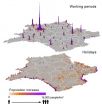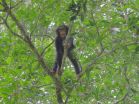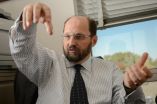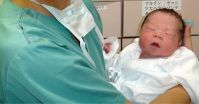(Press-News.org) A study by the University of Southampton has found there are far fewer women studying economics than men, with women accounting for just 27 per cent of economics students, despite them making up 57 per cent of the undergraduate population in UK universities.
The findings suggest less than half as many girls (1.2 per cent) as boys (3.8 percent) apply to study economics at university, while only 10 per cent of females enrol at university with an A level in maths, compared to 19 per cent of males.
"This underrepresentation of women economics degrees could have major implications in policy making," says lead author of the study Dr Mirco Tonin.
"Economists have an influential role in think tanks, ministries, central banks and international organisations, like the IMF and the World Bank."
Previous studies have shown women favour different policy decisions to men, with men more likely to see the costs associated with government interventions in the labour market, for example.
According to the researchers, the lack of women with degrees in economics could also be contributing to the gender pay gap, since economics graduates tend to receive relatively high average earnings.
Using a random sample of administrative data covering all university applications in 2008, the researchers found no discrimination against females in the university application process; once they've applied, females are as likely as males to receive an offer of a place on an economics course. There is also no gender difference in the likelihood of an applicant accepting or rejecting an offer.
Rather the data shows that girls are far less likely to apply to study economics than boys, and this could be partially due to the choices they make when choosing A levels.
"Girls are less likely to have A levels in Maths than boys, and this could represent an impediment to applying for an Economics degree," says Dr Tonin. "However, even among those who have studied Maths, females are still less likely to apply for an Economics degree than males, suggesting that differences in the choice of A level subjects cannot explain the whole gap."
Interestingly, those females who do apply to study Economics tend to have a stronger Maths background and better grades at A Level than male applicants – 46.4 per cent of females get an A grade, compared to 4.36 for males.
The study, which will be published in the CESifo Economic Studies journal, highlights other studies which suggest the gender gap in mathematics disappears in more gender equal societies.
"This suggests that cultural rather than biological factors are behind the gender gap and that a positive loop may develop, with more equality leading to better education achievement by girls, leading in turn to more equality," says co-author Professor Jackline Wahba.
"We believe that enrolment in Economics may be an important channel in this loop. If more girls become proficient in Maths, more are likely to enrol into an Economics degree and, in turn, more are likely to access positions of influence in policy making, from where they can promote a more gender equal society."
INFORMATION:
Notes to editors
1. For interviews with Mirco Tonin please contact Steven Williams Tel: 023 8059 2128, email: S.Williams@soton.ac.uk
2. For a copy of the paper The Sources of the Gender Gap in Economics Enrolment please follow the link: http://ftp.iza.org/dp8414.pdf
3. Through world-leading research and enterprise activities, the University of Southampton connects with businesses to create real-world solutions to global issues. Through its educational offering, it works with partners around the world to offer relevant, flexible education, which trains students for jobs not even thought of. This connectivity is what sets Southampton apart from the rest; we make connections and change the world. http://www.southampton.ac.uk/
http://www.southampton.ac.uk/weareconnected
#weareconnected
For further information contact:
Steven Williams, Media Relations, University of Southampton, Tel: 023 8059 2128, email: S.Williams@soton.ac.uk
http://www.soton.ac.uk/mediacentre/
Follow us on twitter: http://twitter.com/unisouthampton
Like us on Facebook: http://www.facebook.com/unisouthampton
Lack of A level maths leading to fewer female economists
2014-10-28
ELSE PRESS RELEASES FROM THIS DATE:
Physicists' simple solution for quantum technology challenge
2014-10-28
A solution to one of the key challenges in the development of quantum technologies has been proposed by University of Sussex physicists.
In a paper published today (28 October) in Nature Communications, Professor Barry Garraway and colleagues show how to make a new type of flexibly designed microscopic trap for atoms.
Quantum technology devices, such as high-precision sensors and specialised superfast computers, often depend on harnessing the delicate interaction of atoms. But the methods for trapping these tiny particles are hugely problematic because of the atoms' ...
Technique uses bacteria's own CRISPR-Cas system to turn off gene
2014-10-28
Researchers from North Carolina State University have developed a technique that co-opts an immune system already present in bacteria and archaea to turn off specific genes or sets of genes – creating a powerful tool for future research on genetics and related fields.
"This should not only expedite scientific discovery, but help us better engineer microbial organisms to further biotechnology and medicine," says Dr. Chase Beisel, an assistant professor of chemical and biomolecular engineering at NC State and senior author of a paper on the work. "For example, this ...
Researchers prove accuracy of mobile phone population mapping
2014-10-28
A study by an international team, including the University of Southampton, has shown population maps based on anonymous mobile phone call record data can be as accurate as those based on censuses.
Their findings show maps made using mobile records are detailed, reliable and flexible enough to help inform infrastructure and emergency planners; particularly in low income countries, where recent population density information is often scarce.
Southampton geographer and senior author on the study, Dr Andy Tatem, says: "Proving the resilience and accuracy of using mobile ...
Self-reported sleep disturbances are linked to higher risk for Alzheimer's disease in men
2014-10-28
In a new study, researchers from Uppsala University demonstrate that elderly men with self-reported sleep disturbances run a higher risk of developing Alzheimer's disease than men without self-reported sleep disturbances. The results are published in the scientific journal Alzheimer's & Dementia.
The researchers followed more than 1,000 men, who were initially 50 year old, between the years 1970 and 2010. The results of the study show that self-reported sleep disturbances were linked to an increased risk for Alzheimer's disease during the 40-year follow-up period, particularly ...
The early chimp gets the fig
2014-10-28
This news release is available in German.
How do our close relatives, the chimpanzees, acquire sufficient food when times are lean? By studying wild chimpanzees in the Taï National Park in Côte d'Ivoire researchers of the Max Planck Institute for Evolutionary Anthropology in Leipzig, Germany, provide a clear example of how great apes can acquire extra energy needed to maintain large, costly brains. They show that chimpanzees make their sleeping nests more en route to breakfast sites containing fruits that are more competed for by other daytime fruit-eaters ...
Lessons learned from SARS pandemic should inform current contagion protocols
2014-10-28
In 2003, a novel coronavirus caused a pandemic that affected 26 countries. Severe Acute Respiratory Syndrome (SARS) was most prevalent in Asia; the number of cases in Singapore was second only to China.
In an article published in the American Journal of Roentgenology (AJR), a group of radiologists in Singapore outline the ways in which both medical facilities and practitioners there have incorporated lessons learned from the SARS pandemic.
"The pandemic served as a wake-up call for the medical services, which had to respond and reorganize quickly to meet the rapidly ...
Do financial experts make better investments?
2014-10-28
EAST LANSING, Mich. --- Financial experts do not make higher returns on their own investments than untrained investors, according to research by a Michigan State University business scholar.
The first-of-its-kind study analyzed the private portfolios of mutual fund managers and found the managers were surprisingly unsuccessful at outperforming nonprofessional investors. The findings suggest average investors might be better served to handle their own portfolios rather than pay the often-high fees charged by mutual fund managers, said Andrei Simonov, associate professor ...
Identifying the biological clock that governs female fertility
2014-10-28
Researchers at the University of Gothenburg have identified the biological clock that governs female fertility. The discovery represents a major contribution to research aimed at finding medical approaches to treating infertility in women.
Some women can have successful pregnancies at the age of 50, whereas other are unable to get pregnant when they are 30. Researchers are not yet able to fully explain such differences. One factor is that the onset of menopause is influenced by the point at which the uterus runs out of eggs to release.
A recent study at the University ...
New insights into the development of ciliopathies
2014-10-28
"Epithelial cell layers line all of the inner and outer body and organ surfaces in the human body, for example in the lung, intestine, pancreas and in the inner ear," said Moritz Gegg. Cilia – small, hair-like, microtubule-based structures – project from BBs and are precisely positioned on many of these epithelial cells. "Only through this exact positioning can cilia movements be coordinated so precisely that for example mucus can be transported from the lung or sound can be perceived from sensory inner ear hair cells," added Heiko Lickert.
Cilia are anchored ...
Many home blood pressure monitors may be inaccurate
2014-10-28
Philadelphia, PA (October 28, 2014) — Home blood pressure monitors may be inaccurate in up to 15% of patients, according to a study that will be presented at ASN Kidney Week 2014 November 11¬–16 at the Pennsylvania Convention Center in Philadelphia, PA.
Major guidelines recommend home blood pressure monitoring to guide diagnosis and treatment of patients with hypertension; however, little is known about the real-world accuracy of home blood pressure monitors that patients use. Researchers led by Swapnil Hiremath, MD, MPH (Ottawa Hospital and University ...



